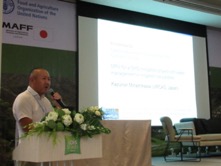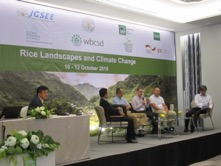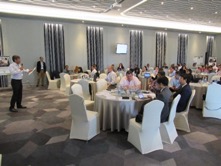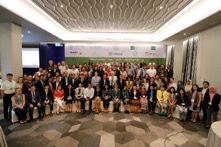Overview
On 10-12 October 2018, FAO (Food and Agriculture Organization of the United Nations) and APEC (Asia-Pacific Economic Cooperation) held an international workshop on “Rice Landscapes and Climate Change” supported by the Ministry of Agriculture, Forestry and Fisheries of Japan at the ibis Styles Bangkok Khaosan Viengtai, Bangkok, Thailand (https://faounfcccagworkshop.wixsite.com/faoricelandscape). This workshop aimed to identify viable options for mitigation and adaptation in rice landscapes and develop scale-up strategies in support of national NDCs (Nationally Determined Contributions) targets. There were nine participating countries from the Pacific region (Cambodia, Chile, Indonesia, Malaysia, Myanmar, Philippines, Lao, Thailand and Vietnam). The workshop attendees shared the latest information regarding climate-change adaptation and mitigation measures in rice landscapes and climate-smart rice cultivation technologies that provided from FAO, NARO (National Agriculture and Food Research Organization, Japan), JIRCAS, etc., and discussed the challenges and opportunities of the agricultural sector in tackling climate change in each participating country.
Dr. Kazunori Minamikawa (Crop, Livestock and Environment Division, JIRCAS) gave two talks entitled “Assessing the feasibility of GHG mitigation through water saving techniques (AWD[1]) in irrigated rice fields in southeast Asian countries” and “MRV[2] for a GHG mitigation project with water management in irrigated rice paddies” in the relevant sections. JIRCAS is implementing the evaluation of mitigation technologies for greenhouse gases emissions from rice paddies in the Mekong Delta, Vietnam under the research program on Environment and Natural Resource Management (https://www.jircas.go.jp/en/program/program_a), and the output from this subject was presented in the workshop.




